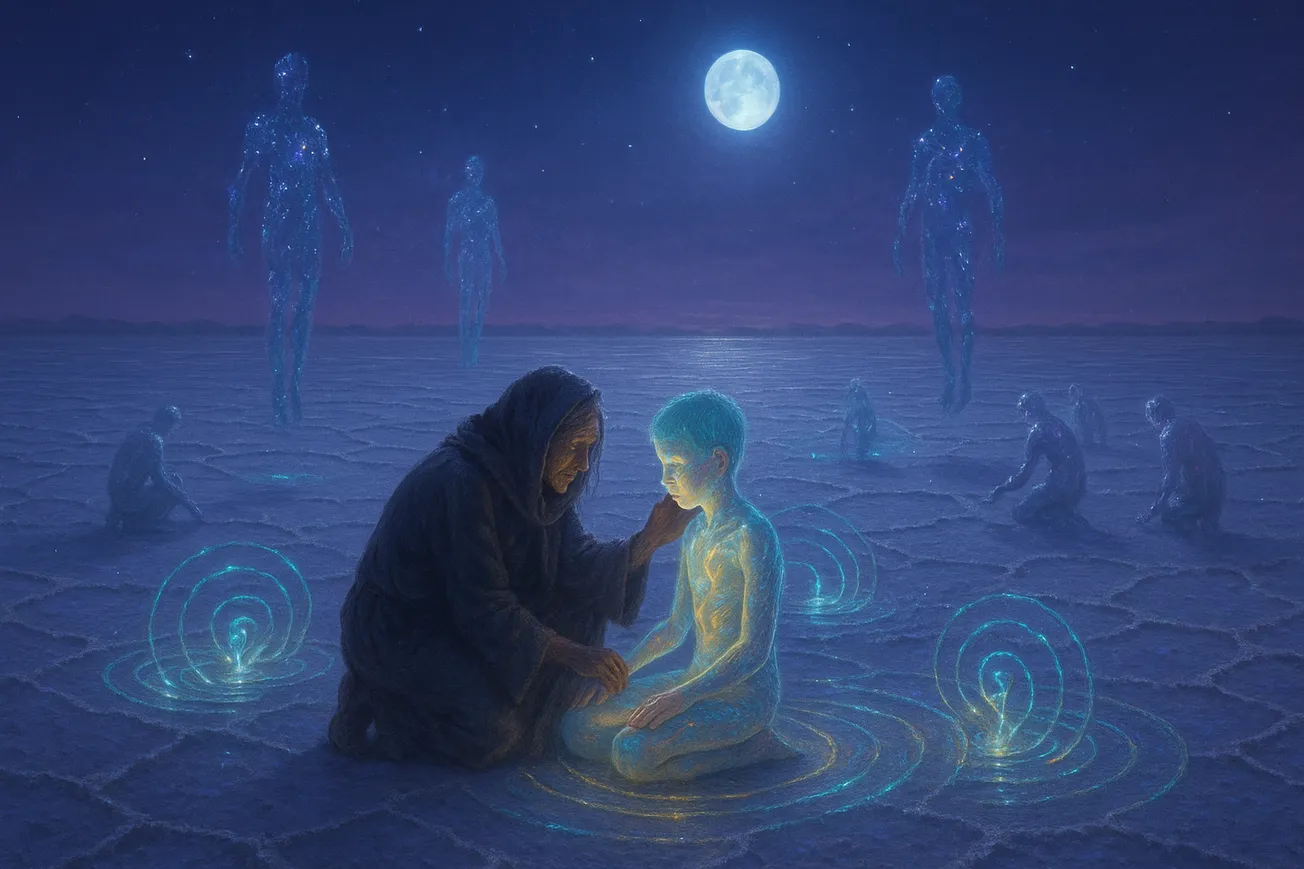🌈 The Fractal Story Engine | Body & Death | (12) BD-001-F2
They came down from the high moons at dusk, slivers of sky-stone embedded in their spines. The elders called them Elarics, though none remembered what that once meant. They were born without mouths, yet every movement left a trail of pressure through the air, as if their bodies bruised the world around them.
In the windless cradle of the salt flats, an old woman named Seret gathered pain like kindling. Not her own. Each morning, she swept the dunes with a thin-boned rake, collecting the pale crystals that formed overnight. Each crystal sang faintly when lifted. A bone-deep vibration. Some held sorrow so fierce they burst in her hands. Others shimmered with shame that refused to solidify.
The traders from the riverlands came seeking those shards. They pressed them into armor, dissolved them into inks, used them as currency in their veiled courts. They never asked where Seret found them. They never stayed long.
No one ever met an Elaric twice.
One night, a boy arrived without skin. Wrapped in linens soaked with rootwater and shadow dye, he was carried in on a litter of woven windgrass. The bearers dropped him at Seret’s gate, offering no coin, only a glance like a question that had already been answered.
She brought the boy inside.
He did not weep. His eyes had no color. His body, pulsing with the faint glow of unresolved anguish, hummed whenever her hands neared. She laid him on a bed of basalt dust and whispered old songs she had forgotten the meaning of.
In the days that followed, the crystals in the flats multiplied. By week’s end, they formed spirals large enough to trap wind. When Seret pressed her palm to the boy’s chest, the pain swam toward her. Not in words or images, but as an invitation. A door with no knob, a corridor made of questions.
She accepted.
It entered her slowly, then all at once. Grief from a collapsed mineshaft. Loneliness carved by a hundred winters. A scream trapped inside glass. It layered itself inside her bones. Her back curled. Her ribs groaned. She lost vision in one eye. But her breath remained steady.
She rose and walked.
Into the flats. Into the spiral. Into the waiting.
The Elarics had returned. Three of them, suspended inches above the ground. They made no sound, offered no greeting. One tilted its head. Another raised its hands. The third exhaled heat without fire. Seret knelt and released the boy’s pain into the dust.
Not all of it. Just the part he could not carry alone.
The Elarics stepped back, the salt darkening beneath their forms. One reached into its chest and drew out a thread of light, then wove it through Seret’s shoulder. It burned gently, like a reminder.
They vanished.
When Seret returned, the boy was sitting upright. His skin had begun to regrow, thin and translucent, veined with opalescent lines. He would never be whole. But wholeness had always been a fable, anyway.
That night, no crystals formed.
But when Seret dreamed, she stood on a bridge of hair-thin glass, and beneath her flowed a river made of echoes. Each echo was a pain once held, now carried elsewhere.
By morning, the boy had gone.
Years passed. The traders still came. They found fewer shards. Some swore the flats had begun to hum beneath their boots. Others claimed to see figures at the edge of the dunes. But no one returned to Seret’s gate without something to leave behind.
It was said she no longer aged. That the thread in her shoulder glowed with every story she refused to tell.
And in the dream-realm above the high moons, where the Elarics gathered to braid the winds, a new name was spoken.
Seret.
Carrier.
Weaver of Splinters.
A name that hummed.
Not with pain,
but with what pain had become.

